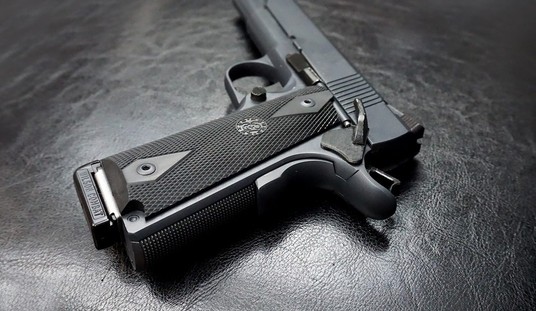Jim Handy is a semiconductor industry analyst at Objective Analysis who also writes for Forbes. He thinks it sure would be a swell idea if you gun-toting rednecks would be required to put an RFID chip in your guns, so that his industry can maybe make up to $1.10 for every gun sold.
The same kind of RFID tag is used to identify stray or stolen pets in a process called “Chipping”. My veterinarian told me that these chips are implanted between the shoulder blades, but that they often coast all over the animal’s body. Imagine having to hold your gun “just so” because your chip had coasted from your hand into your wrist.
Another approach which may be a little less sure but is decidedly more appealing is that of putting the owner’s RFID tag into a ring or bracelet. It’s not as secure as an implanted RFID tag, since the ring or bracelet can be stolen, but it doesn’t require surgery.
Some voice concerns that such measures may undermine gun ownership. Certain gun advocates worry that any new technology added to guns will allow outsiders to disable the use of their firearms. Others argue that any new component will serve to decrease the reliability of the gun, leading to the possibility of a malfunction when the weapon is needed the most.
Even so some states in the US have already introduced legislation to encourage adoption of smart guns. New Jersey passed a law in 2002 requiring gun stores to sell only smart guns within 3 years after they become generally available.
What would mass adoption of RFID in firearms mean to the semiconductor industry? Unfortunately, not much. RFID chips cost less than ten cents each, and the electronics behind the reader is unlikely to cost as much as a dollar. Multiply that by about 20 million gun sales in the US every year and you come up with a total market that is less than 0.1% of today’s $300 billion in total semiconductor revenues.
Handy says that he wants to force this infringement upon us to stop unauthorized use and save lives (and make a small profit).
What he doesn’t mention is that no one has been able to manufacture a RFID-equipped chip system for handguns that is remotely reliable. The German-made Aramatix is the top of the technological heap, and though it fires only the low-recoiling .22LR, it works just 90-percent of the time, which means it fails every single magazine.
Time and again Americans have rejected smart gun technology as unsafe and unreliable, and in a poll conducted in November of 2013, 81% of Americans rejected the concept outright. This is far higher than the actual number of Americans that support universal background checks at gun shows, which is just 40-percent.
Eve more worrisome is that such technology could be hacked, rendering tens of millions firearms non-functional with a keystroke.
While totalitarians are certainly keen on such an idea, liberty-loving citizens have already made their position on so-called “smart guns” very clear.








Join the conversation as a VIP Member